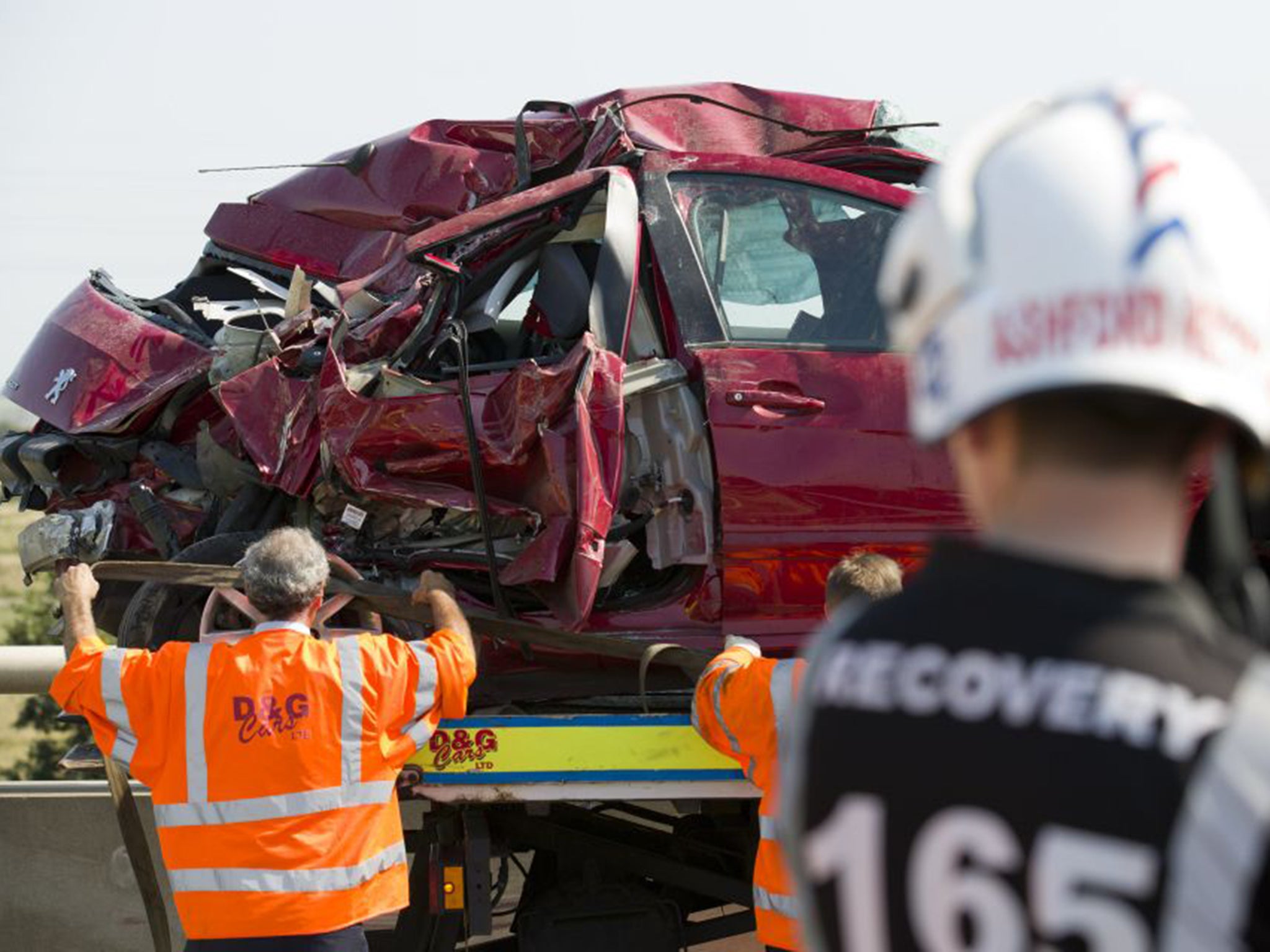Dramatic rise in road deaths as numbers of traffic police fall
Casualties have jumped by a third in places as patrols on Britain's motorways have been cut

A fall in traffic police numbers is fuelling a dramatic rise in road casualties, according to road safety campaigners and police representatives.
Their stark warning comes as new figures are expected to show that road deaths have risen for a third consecutive quarter after road policing units have been forced to “retreat” from Britain’s motorways, major and rural roads.
Officers have told the Police Federation that cuts in the number of specially trained traffic officers and the merger of traffic units has robbed senior officers of a “vital deterrent” in the battle against dangerous drivers and led to increased accidents on Britain’s congested roads.
On Thursday, new Department for Transport figures are expected to confirm a continued spike in those killed or seriously injured (KSI) on the road. This follows figures in November which revealed that KSIs had risen 4 per cent, to 24,580, in the first six months of 2014.
The Roads minister, Robert Goodwill, used a parliamentary road safety reception last week to “lay ground for bad news” ahead of Thursday’s announcement, and warned attendees to expect a “rise” in fatalities.
Campaigners point out that the rise follows a five-year decline in policing budgets, which has led to traffic units particularly being hit.
Road policing numbers have fallen 12 per cent nationally, with some forces suffering up to 40 per cent reductions and others losing their dedicated units, according to the road safety charity Brake.
The charity described the rise in deaths as the “tragic result of a failure of ambition” by government.
The Police Federation has warned that its members are “frustrated and dismayed” by the level of cuts. Jayne Willetts, Police Federation lead on traffic, said: “Police officers are absolutely frustrated by the rise in fatalities because, at the end of the day, we need more officers in marked cars acting as a deterrent.
“We welcome hi-tech developments, including the emerging smart motorway network, but the increasing reliance on automated technology and cameras can’t compensate for the decline in traffic police, who are the most effective way of combating dangerous drivers, drink drivers and people using mobile phones while driving.”
AA president Edmund King said: “It would certainly appear that police have retreated from motorways, albeit leaving some weaponry on overhead gantries in the form of cameras. This does nothing to deter the dangerous tailgaters and undertakers. It is a rare sight to spot a police patrol car on the motorway unless there has been a collision. Their visual presence not only deters excessive speeding but reminds the minority of potentially dangerous and reckless drivers that they might not get away with it.”
The experts’ warning came as a number of police forces from across the country released independent figures revealing a rise in road deaths in 2014. Covering the whole year in advance of official government statistics, these showed a sharp rise in deaths in the Thames Valley force area – up 36 per cent, to 78 – in Lincolnshire – up 14 per cent, to 40 – and in Northern Ireland – up 38 per cent, to 79 deaths.
The spiralling toll prompted Michael Dugher, Labour’s transport spokesperson, to criticise the Government for scrapping mandatory road safety targets in 2011.
He said: “There are now 16,701 fewer police officers than in 2010. This has clearly had an impact on motorway police numbers. We made progress during the last government, but we have now lost our place at the top of the leader board for EU road safety.”
According to Neil Greig, policy director of the Institute of Advanced Motorists, the “fundamental problem” is that the Home Office no longer holds roads policing as a “key priority”.
“Chief constables are tracked on a range of objectives, including terrorism, but road safety is not a key performance indicator, and very few police commissioners gave it top billing during their election campaigns,” he said.
Louise Ellman MP, chair of the transport select committee, said yesterday that they would examine the issue after the general election.
She said: “I think it is of major concern that roads policing has been reduced. We know major areas of danger are around drink driving and mobile-phone use, and that requires a physical police presence on our roads which automated technology cannot replace.”
This call was welcomed by David Davies, executive director of the Parliamentary Advisory Council for Transport Safety. He said: “It’s not simple. Weather, traffic levels and council spending all play a role in accidents, but there is clearly a link between visible police enforcement and reducing accidents. The Government has got to the end of the road on their action plan. They got rid of road safety targets despite 20 years of success and dramatic falls in road deaths from 2007 to 2008. We need a new plan.”
A Government spokesperson said: “The Government is determined to keep people safe on our roads and to help the police keep people safe by introducing measures such as a new drug driving offence.
“Like all parts of the public sector, the police are making their contribution to reducing the deficit – but there is no question that they will still have the resources to do their important work.”
Join our commenting forum
Join thought-provoking conversations, follow other Independent readers and see their replies
Comments